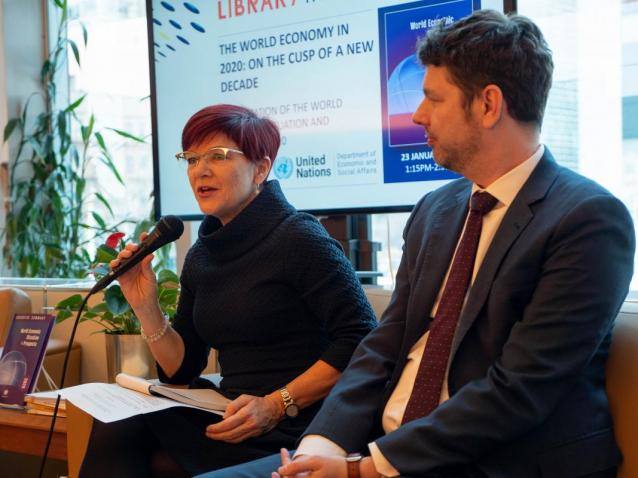On 23 January 2020, the Dag Hammarskjöld Library held this year’s debut Insight Series about the recently launched UN flagship publication World Economic Situation and Prospects 2020.
The Library invited two co-authors of the report, economists Ingo Pitterle and Sebastian Vergara of the UN Department of Economic and Social Affairs (DESA), to highlight the key findings of the report. Chantal Line Carpentier, Chief of the New York Office of the UN Conference on Trade and Development (UNCTAD) moderated and engaged the audience in a lively discussion on the current state of and outlook for the global economy.
I wish we had good news for you today but unfortunately, we do not, was the opening statement by the co-authors who highlighted that the global economy had experienced a slowdown in 2019, marked by increased trade tensions and inequality, as well as insufficient investments in the real economy.
The analysis in the report focussed on how the findings compared to the benchmarks set by the Sustainable Development Goals (SDGs) and related targets. The presenters noted that in particular the goal of eradicating poverty by 2030 remained a daunting challenge.
The co-authors highlighted several serious risks that could destabilize the global economy in the future, among them record-high debt, insufficient action to rein in climate change and transition energy systems away from fossil fuels, financialization of the economy, and a lack of innovation in developing countries. They concluded by urging fundamental reforms in the areas of monetary, fiscal, trade and energy policy in order to mitigate those risks and move the global economy towards closer alignment with the SDGs.
To learn more about issues impacting the global economy, the Library recommends:
Global Sustainable Development Report, 2019
Human Development Report, 2019 (focus on inequality)
World Development Report, 2020 (focus on global value chains in international trade)
World Social Report, 2020 (focus on inequality)


